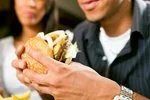Healthy eating, like Effexor, can improve mood
Bad eating habits can worsen mood and even lead to depression.
Unhealthy eating behaviors may cause women to experience worse moods, according to Penn State researchers. The study focused on women in their daily lives to better observe the relationship between emotion and eating. "There was little in the way of mood changes right before the unhealthy eating behaviors," said Kristin Heron, research associate at the Survey Research Center. She and other researchers found that positive moods were unaffected by unhealthy behaviors. "However, negative mood was significantly higher after these behaviors." The study observed 131 women who did not have eating disorders but did have high levels of unhealthy eating habits and and concerns about their body shape and weight. Each woman had a handheld computer that would prompt her to answer questions about her mood and eating habits throughout the day. Joshua Smyth, professor of biobehavioral health at Penn State, said the study could lead to better treatments for women experiencing eating problems. "The results from this study can help us to better understand the role mood may play in the development and maintenance of unhealthy eating, and weight-control behaviors, which could be useful for creating more effective treatment programs for people with eating and weight concerns," said Smyth. What eating behaviors worsen mood? Stress leads to a rise in cortisol levels, which cause food cravings particularly for carbs and sweet foods, according to research from the University of California at San Francisco Medical Center. Cortisol also triggers an enzyme in fat cells to create more cortisol. Last year, a study headed by scientists from the University of Las Palmas de Gran Canaria and the University of Granada in Spain found that eating commercial baked goods and fast food is linked to depression. Consumers are 51 percent more likely to develop depression than those who abstain, the study showed. Researchers also found a dose-response relationship, meaning that the more fast food or commercial baked goods a person consumes, the greater their risk of depression becomes. What eating behaviors are good for the mood? |
Toll-Free Tel : 1-877-278-5387
Toll-Free Fax: 1-877-278-5359
Toll-Free Fax: 1-877-703-3038
Toll-Free Fax: 1-877-703-3038




